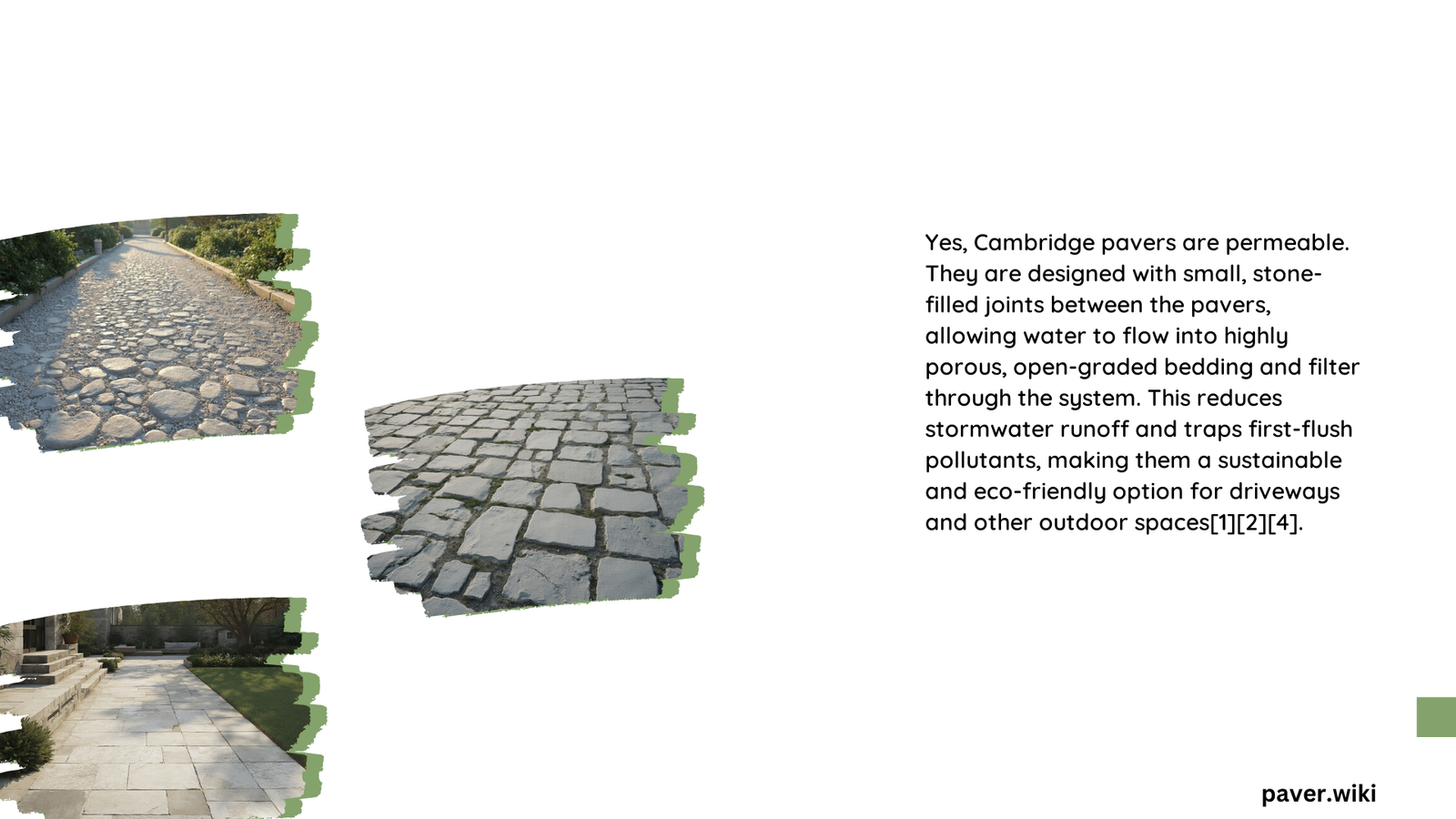Cambridge pavers are designed to be permeable, offering an effective solution for stormwater management. These pavers are part of a system that allows for natural drainage and groundwater recharge, with specific designs to enhance permeability. Cambridge permeable pavers can manage rainfall from 75 to 85% of all storms and handle the rainfall from 100% of low-intensity storms, making them an excellent choice for environmentally conscious landscaping and construction projects.
What Makes Cambridge Pavers Permeable?
Cambridge pavers are engineered with permeability in mind, incorporating several key features:
- Specialized designs like the Ledgestone Permeable 3-Pc. Design Kits and Aqua-Bric Type 1
- Openings and joint spaces filled with aggregate materials
- Compliance with Interlocking Concrete Pavement Institute (ICPI) standards
- Recognition as Best Management Practices (BMPs) by environmental regulatory agencies
These features work together to create a permeable surface that effectively manages stormwater runoff while maintaining aesthetic appeal.
How Are Cambridge Permeable Pavers Installed?

The installation process for Cambridge permeable pavers involves a multi-layered system designed to maximize water infiltration:
- Sub-base layer: ASTM number 2 stone (3/4 inch to 2.5 inches)
- Middle layer: ASTM number 57 stone (1/8 inch to 1.5 inches)
- Setting bed layer: ASTM number 8 stone (1/8 to 3/8 inch)
- Paver layer with oversized spacer bars
Here’s a breakdown of the installation process:
| Layer | Material | Depth | Purpose |
|---|---|---|---|
| Sub-base | ASTM #2 stone | 6+ inches | Water storage |
| Middle | ASTM #57 stone | 4 inches | Filtration and distribution |
| Setting bed | ASTM #8 stone | 1.5-2 inches | Paver foundation |
| Joint filling | ASTM #8 stone | Varies | Water infiltration |
Additional installation considerations include:
- Use of concrete curbs for edge restraint
- Installation of geotextile fabric for stabilization
- Soil type assessment and potential drainage pipe installation
What Are the Benefits of Cambridge Permeable Pavers?
Cambridge permeable pavers offer numerous advantages:
- Stormwater Management: Can reduce water runoff by up to 100%
- Land Planning Enhancement: Reduces need for retention ponds
- Environmental Impact: Aids in groundwater recharge and improves water quality
- Urban Flooding Mitigation: Reduces strain on existing stormwater systems
These benefits make Cambridge permeable pavers an attractive option for both residential and commercial applications.
How Should Cambridge Permeable Pavers Be Maintained?
Proper maintenance is crucial for the long-term performance of Cambridge permeable pavers:
- Regular sweeping to remove surface debris
- Periodic vacuuming or blowing to clear joint sediment
- Avoidance of sealers or chemicals that could clog pores
Maintenance frequency:
– Typically semi-annual
– As needed based on site conditions
Potential challenges:
– Joint and base layer clogging
– Addressed through regular maintenance
Cost considerations:
– Generally lower lifecycle costs compared to traditional stormwater management systems
– Cost-effective over a 30-year analysis period
Are Cambridge Pavers Suitable for All Climates?
Cambridge permeable pavers are designed to perform in various climates, but considerations include:
- Freeze-thaw cycles in cold climates
- Heavy rainfall in tropical areas
- Drought conditions in arid regions
Proper installation and maintenance can help address climate-specific challenges.
How Do Cambridge Permeable Pavers Compare to Other Paving Options?
When compared to traditional paving materials, Cambridge permeable pavers offer:
- Superior water management capabilities
- Reduced environmental impact
- Potential for LEED credits in green building projects
- Aesthetic versatility with various colors and patterns
However, they may require more specialized installation and maintenance.
What Are the Long-Term Performance Expectations for Cambridge Permeable Pavers?
Long-term performance of Cambridge permeable pavers depends on several factors:
- Proper installation following manufacturer guidelines
- Regular maintenance and cleaning
- Site-specific conditions such as soil type and traffic load
- Climate and weather patterns
When properly installed and maintained, these pavers can provide effective stormwater management for decades.
In conclusion, Cambridge pavers are indeed permeable and offer a robust solution for stormwater management. Their specialized design, coupled with proper installation and maintenance, makes them an excellent choice for environmentally conscious construction and landscaping projects.
References:
1. https://www.youtube.com/watch?v=gqFONZ80FvI
2. https://www.flssupply.com/pages/permeable-pavements
3. https://www.cambridgepavers.com/pavers-details?prodid=252
